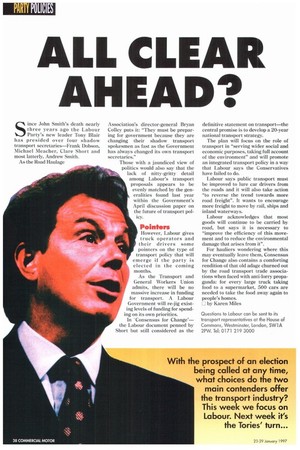ALL CLEAR AHEAD?
Page 40

If you've noticed an error in this article please click here to report it so we can fix it.
Since John Smith's death nearly three years ago the Labour Party's new leader Tony Blair has presided over four shadow transport secretaries—Frank Dobson, Michael Meacher, Clare Short and most latterly, Andrew Smith.
As the Road Haulage Association's director-general Bryan Colley puts it: "They must be preparing for government because they are changing their shadow transport spokesmen as fast as the Government has always changed its own transport secretaries."
Those with a jaundiced view of politics would also say that the lack of nitty-gritty detail among Labour's transport proposals appears to be evenly matched by the generalities found last year within the Government's April discussion paper on the future of transport policy.
Pointers
However, Labour gives truck operators and heir drivers some pointers on the type of transport policy that will emerge if the party is elected in the coming months.
As the Transport and General Workers Union admits, there will be no massive increase in funding for transport. A Labour Government will re-jig existing levels of funding for spend ing on its own priorities.
In 'Consensus for Change'— the Labour document penned by Short but still considered as the definitive statement on transport—the central promise is to develop a 20-year national transport strategy.
The plan will focus on the role of transport in "serving wider social and economic purposes, taking full account of the environment" and will promote an integrated transport policy in a way that Labour says the Conservatives have failed to do.
Labour says public transport must be improved to lure car drivers from the roads and it will also take action "to reverse the trend towards more road freight". It wants to encourage more freight to move by rail, ships and inland waterways.
Labour acknowledges that most goods will continue to be carried by road, but says it is necessary to "improve the efficiency of this movement and to reduce the environmental damage that arises from it".
For hauliers wondering where this may eventually leave them, Consensus for Change also contains a comforting rendition of that old adage churned out by the road transport trade associations when faced with anti-lorry propaganda: for every large truck taking food to a supermarket, 500 cars are needed to take the food away again to people's homes.
LJ by Karen Miles
Questions to Labour can be sent to its transport representatives at the House of Commons, Westminster, London, SW1A 2PW. Tel: 0171 219 3000
































































































